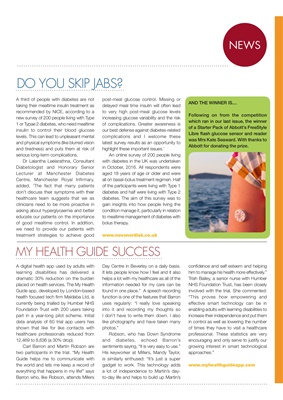
NEWS
DO YOU SKIP JABS?
MY HEALTH GUIDE SUCCESS
A third of people with diabetes are not
taking their mealtime insulin treatment as
recommended by NICE, according to a
new survey of 200 people living with Type
1 or Typae 2 diabetes, who need mealtime
insulin to control their blood glucose
levels. This can lead to unpleasant mental
and physical symptoms (like blurred vision
and tiredness) and puts them at risk of
serious long-term complications.
Dr Lalantha Leelarathna, Consultant
Diabetologist and Honorary Senior
Lecturer at Manchester Diabetes
Centre, Manchester Royal Infirmary,
added, 'The fact that many patients
don't discuss their symptoms with their
healthcare team suggests that we as
clinicians need to be more proactive in
asking about hyperglycaemia and better
educate our patients on the importance
of good mealtime control. In addition,
we need to provide our patients with
treatment strategies to achieve good
post-meal glucose control. Missing or
delayed meal time insulin will often lead
to very high post-meal glucose levels
increasing glucose variability and the risk
of complications. Greater awareness is
our best defense against diabetes-related
complications and I welcome these
latest survey results as an opportunity to
highlight these important issues.'
An online survey of 200 people living
with diabetes in the UK was undertaken
in October, 2016. All respondents were
aged 18 years of age or older and were
all on basal-bolus treatment regimen. Half
of the participants were living with Type 1
diabetes and half were living with Type 2
diabetes. The aim of this survey was to
gain insights into how people living the
condition manage it, particularly in relation
to mealtime management of diabetes with
bolus therapy.
www.novonordisk.co.uk
A digital health app used by adults with
learning disabilities has delivered a
dramatic 30% reduction on the burden
placed on health services. The My Health
Guide app, developed by London-based
health focused tech firm Maldaba Ltd, is
currently being trialled by Humber NHS
Foundation Trust with 200 users taking
part in a year-long pilot scheme. Initial
data analysis of 60 trial app users has
shown that like for like contacts with
healthcare professionals reduced from
12,469 to 8,636 (a 30% drop).
Carl Barron and Martin Robson are
two participants in the trial. "My Health
Guide helps me to communicate with
the world and lets me keep a record of
everything that happens in my life!" says
Barron who, like Robson, attends Millers
Day Centre in Beverley on a daily basis.
It lets people know how I feel and it also
helps a lot with my healthcare as all of the
information needed for my care can be
found in one place." A speech recording
function is one of the features that Barron
uses regularly: "I really love speaking
into it and recording my thoughts so
I don't have to write them down. I also
like photography and have taken many
photos."
Robson, who has Down Syndrome
and diabetes, echoed Barron's
sentiments saying, "It is very easy to use."
His keyworker at Millers, Mandy Taylor,
is similarly enthused: "It's just a super
gadget to work. This technology adds
a lot of independence to Martin's dayto-day life
and helps to build up Martin's
confidence and self esteem and helping
him to manage his health more effectively."
Trish Bailey, a senior nurse with Humber
NHS Foundation Trust, has been closely
involved with the trial. She commented:
"This proves how empowering and
effective smart technology can be in
enabling adults with learning disabilities to
increase their independence and put them
in control as well as lowering the number
of times they have to visit a healthcare
professional. These statistics are very
encouraging and only serve to justify our
growing interest in smart technological
approaches."
www.myhealthguideapp.com
AND THE WINNER IS....
Following on from the competition
which ran in our last issue, the winner
of a Starter Pack of Abbott's FreeStyle
Libre flash glucose sensor and reader
was Mrs Kate Seaward. With thanks to
Abbott for donating the prize.